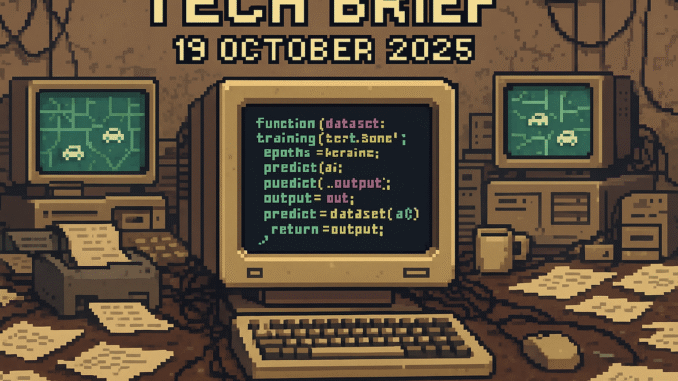
Tech Brief 19 October 2025 opens with a confession. Some days, writing for this crowd means owning up to the ways British technology stubbornly fails, innovates, or just lingers past its sell-by date. Today’s mix of legacy IT, autonomous vehicles, and the bitter aftertaste of old software scandals is a reminder that human trust and technical decisions still make or break lives. Missed yesterday’s Tech Brief? Catch up here before diving in.
Post Office Capture Referral Puts Software Scandal Back in Court
“How could anyone trust a system that never apologised when it got things wrong?” The Criminal Cases Review Commission has now sent Patricia Owen’s conviction to the Court of Appeal, focusing attention not on Fujitsu’s Horizon, but on the Post Office’s Capture software. The scandal is spreading.
Manuals uncovered from the early 2000s already flagged quirks, but so often, technical fine print never reached those on the front line. We all remember that awkward switch from ‘your word is enough’ to ‘the printout is always right,’ a moment that changed trust in technology for good. Families lost livelihoods, reputations were demolished, all because an IT system gained institutional authority it never deserved.
The callback here is honesty. Every line of code can ruin a real life if nobody questions it.
MPs Warn Legacy Tech Blocks UK AI Ambitions
A raw fact opens this story: two Commons committees just admitted the government does not know the true scale of its ancient IT estate. It is not sound and fury, it is spreadsheets, COBOL, and dusty terminals; bits of software holding together benefits payments, NHS systems, and more.
Imagine being asked to glue AI on top. For the millions working with these systems, tech modernisation means sorting out what’s actually running first. Parliamentary debate finally catches up to the knowledge base already held by Gen-X engineers, sysadmins, and everyone who’s ever waited for approval to reboot a critical mainframe.
Instead of dramatic schemes, it’s tape storage, inherited passwords, and code comments written on Post-it notes. Progress will lag until the public sector knows its own hardware. Truth is, some fixes are about people, not machines.
Waymo Plans Robotaxis for London As Driverless Push Resumes
Do you trust a driverless car on the A3 at rush hour? Waymo claims London streets will see its autonomous taxis from 2026. The vision is bold, but the timeline runs right up against British caution and a city built long before LiDAR sensors were glued to roofs.
For a generation raised on TV promises of robotic cars, this is late but not unexpected. British regulators always demand data, trials, and wary optimism before opening the gates. The real test is not technical; it’s cultural, social, and more about how a black cab driver rolls their eyes than about software reliability.
One colleague still claims we will see flying cars first. Is that a real deadline, or just office banter?
Online Misinformation Fuels Riots, Say MPs in New Warning
Parliament’s science and tech committee has stated plainly: fail to curb viral misinformation and another riot is, in their words, “only a matter of time.” The memory of the 2024 unrest is far from faded.
Chair Chi Onwurah has lambasted ministers for complacency, putting the blame on social media algorithms that promote extremism, confusion, and outright lies. For those who built the hopeful web of the 1990s, this is bitter reading; a network once designed for openness now amplifies chaos.
As explored in the story about legacy infrastructure, systems built without real oversight can outgrow their inventors’ intentions.
From the Wayback Machine
On This Day: 1948 – SWAC authorisation brings the world’s fastest computer to life in Los Angeles. Designed by Harry Huskey, the Standards Western Automatic Computer packed in 2,300 vacuum tubes and pioneering Williams CRT memory. It ran lengthy scientific calculations, supported Nobel-level research, and set expectations for modular design and public sector engineering. The DNA of SWAC, build when you cannot buy, lives on in every coder still soldering upgrades to ancient systems.
What This Means
Tech Brief 19 October 2025 is a day of honest reckoning with the systems we inherit, complex, flawed, and still remarkably human. The real thread? Technology’s impact feels personal because it is. Scandals, AI dreams, riots, they are all built and felt by people on the ground.
Stay alert, stay noisy, and remember: sometimes the best tech is a story waiting to be told at the next user group meet.
Missed yesterday’s Tech Brief? Catch up here

Leave a Reply